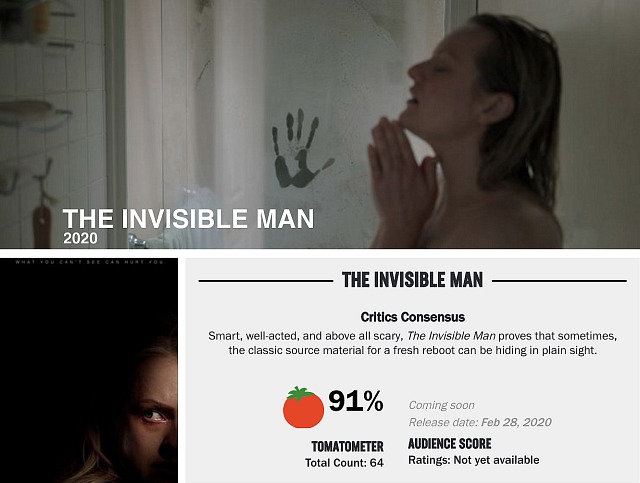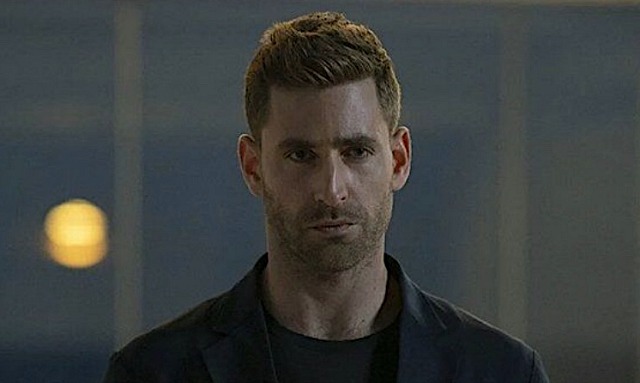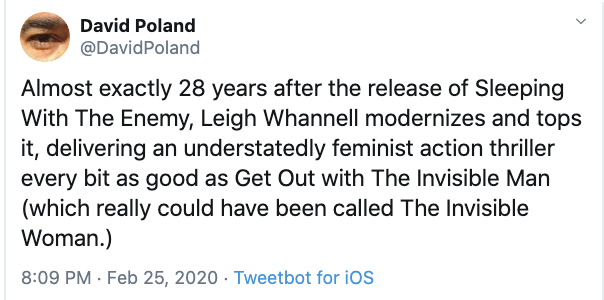Leigh Whannell‘s The Invisible Man (Universal, 2.28) is a reasonably well-made if somewhat rote and occasionally boring horror-thriller with a feminist slant. It’s basically a serving of calculated exploitation aimed at the #MeToo peanut gallery. That’s all it is, and all it will ever be.
It’s okay to shrug and call this piece of Blumhouse sausage a half-decent if uninspired genre exercise, but any critic who gives it an enthusiastic hug is being a political whore, trust me.
Nobody wants to dismiss a B-grade thriller that takes the side of a terrified if resourceful ex-wife (in this instance the sweaty, stressed-out, baggy-eyed Elizabeth Moss) trying to survive a campaign of terror by an invisible ex-husband. The deal is this: If you don’t like it you’re somehow unsympathetic to the cause so everyone “likes” it. Safer that way.

I shouldn’t have to repeat that we’re all living in a climate of revolutionary terror, but I guess I have to. Most critics simply can’t be trusted in such an environment. This is why The Invisible Man currently has a 90% approval rating on Rotten Tomatoes. This is a relatively okay film, granted, but calm down.
I sat in the front row during last night’s Arclight screening and went “uh-huh…uh-huh…uh-huh.” After a while I gave up and went “okay, whatever.” And then I started checking my watch every 15 minutes.
The Invisible Man is basically (a) a “terrified ex-wife is stalked by a brilliant, deranged, control freak ex-husband” flick (closely related to 1990’s Sleeping With The Enemy) mixed with (b) Paul Verhoeven‘s Hollow Man (’00).
The latter, of course, was a high-tech riff on James Whale‘s original The Invisible Man (’33) with Claude Rains.
In both the Verhoeven and the newbie the invisible bad guy is a brilliant arrogant scientist (played in The Invisible Man by Oliver Jackson-Cohen and by Kevin Bacon in The Hollow Man). Moss is basically playing an antsier, more wild-eyed version of Elizabeth Shue‘s role in The Hollow Man — the panicking ex-girlfriend whose invisible boyfriend has gone bonkers. The difference this time is that Jackson-Cohen’s character was deranged to begin with. Or he was before he “died.”
Question to Whannell: Why did Moss’s Cecilia Kass, whom we’re told to sympathize and identify with…why did she marry this super-rich psycho to begin with? Because…what, she couldn’t resist the idea of being wealthy? Or because he was completely sane and level-headed when she was first falling in love with him, and he only turned into a looney-tune when he became rich? HE calls bullshit on that.
One look at Jackson-Cohen’s demonic, half-bearded features tells you he’s a sicko. Or rather an actor playing one. He has those kind of eyes, that kind of vibe. I hate thrillers with villains who’ve been told to act like twitchy nutters. That is certainly the case here, and it’s boring.
There are two major “steals” in Whannell’s screenplay. One is a North by Northwest restaurant scene between Cecilia and her sister, Emily (Harriet Dyer). It’s borrowed from United Nations lounge scene in which poor Lester Townsend…I don’t need to complete this sentence. The difference is that Cary Grant dropped the knife fairly quickly while exclaiming “wait…I had nothing to do with this!” Let’s just say that Moss’s character isn’t as fast on her feet.
The other big steal is from the “Sarah Connor running around the mental hospital” sequence in Terminator 2: Judgment Day (’91).
I didn’t mind The Invisible Man but I probably would have had a less charitable response if I’d paid $17 bucks to see it.



